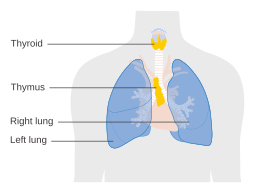Have you ever heard of the thymus? If not, most people could probably say the same, despite the enormous role it plays in our overall health. The thymus is a small gland in the upper part of the chest that is crucial to the immune systems of children. After puberty, the gland was previously thought to become smaller, gradually turn to fat through a process called fatty regeneration, and lose its function. Through the use of CT scans, a recent study shows that contrary to prior belief, this organ can be significant in adults as well, and the state of it can be influenced by lifestyle, age, and sex.
The main function of the thymus is to develop all the body’s immune cells before puberty. In order to carry out this function, the gland produces the hormone thymosin. Cells called lymphocytes pass through the thymus where they are fully developed into T cells, with the help of the hormone. Once they are fully developed, they are transferred to the lymph nodes where they help the body fight off infections and prevent autoimmune diseases. Autoimmune diseases occur when an immune system attacks cells from its own body. Have you ever touched your neck when sick and felt a small swollen part? Those are your lymph nodes! When you have an upper respiratory infection, more T cells rush to your lymph nodes to help your body fight off the illness. This is just one example of your immune system in action.
When you think of proteins, what is the first thing you think of? As presented in the AP Biology curriculum, proteins are not just a food group we eat everyday, though they are still very important to ingest! They are part of every cell in our bodies and therefore are crucial to the immune system and the thymus. Immune cells have receptor proteins attached to them that bind to foreign and potentially harmful substances, also called antigens. When the proteins bind to the substance, they trigger the body’s immune system to fight off the antigen. There are two types of immune systems: the innate immune system and the adaptive immune system. The innate immune system fights antigens mostly using killer cells and phagocytes (“eater cells”). The adaptive immune system makes antibodies that are made to fight off specific germs that the cell recognizes.
A new study performed in Sweden looked at the CT scans of 1000 people between the ages of 50-64, and examined the state of their thymuses. The people previously participated in the SCAPIS study which inspected their lifestyles and dietary habits. Results found that 6 out of 10 of the participants had a thymus that was completely turned to fat. It was more common in men and obese people. Dietary habits such as low fiber intake caused more fatty regeneration. People whose thymuses endured more fatty regeneration showed evidence of lower T cell regeneration. Ultimately, the CT scans showed the functionality of the thymus and the immune system. More studies must be performed to fully know whether or not the aging of the immune system affects our health, which is why this research will be expanded to the other 4000 participants of the SCAPIS study.
While people cannot change their sex and age, they can change their lifestyles. This study presents new information that can be used to help people improve their health. For example, I get the common cold once every few months and sometimes the grueling symptoms last for weeks. In the future, I will try to increase my fiber intake over a long period of time, which could possibly lower my chances of getting sick, feeling the harsh symptoms, or having them for a long time. I invite any and all comments to tell me whether or not this information could influence your lifestyle, and how.



Leave a Reply